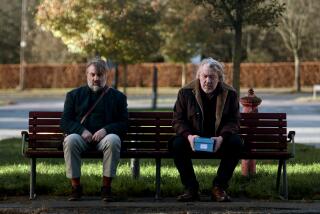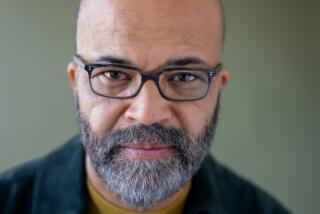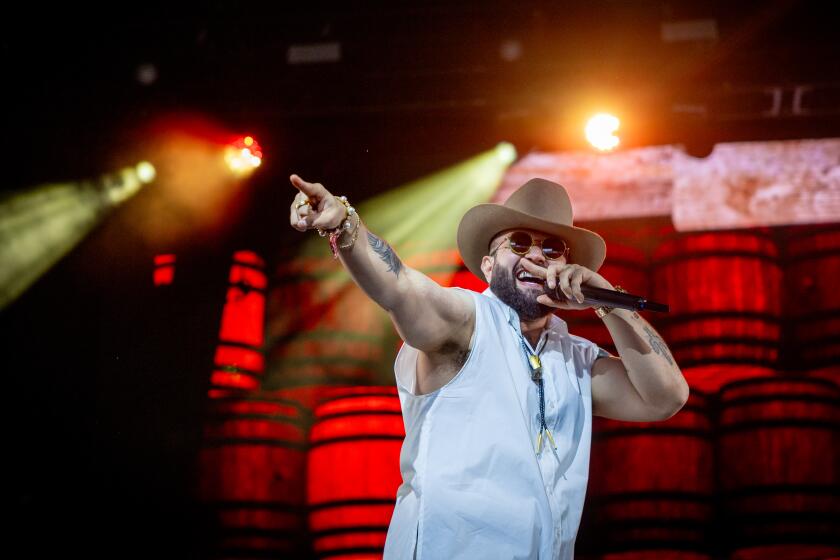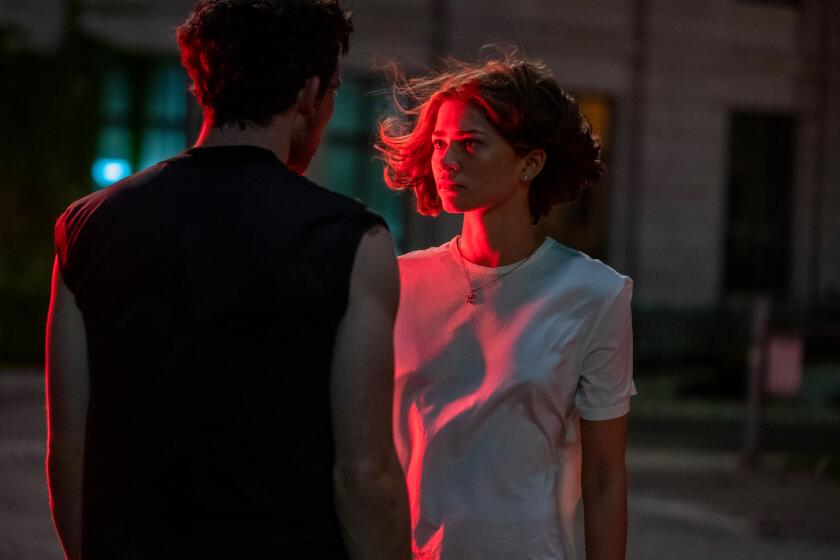Zachary Quinto rides a wave of professional, personal growth
In late 2008, “Margin Call” looked like the kind of film project that could languish indefinitely: an unfinanced script from a first-time writer-director on a wonkish subject — the math behind Wall Street’s recent collapse.
Then Spock beamed in.
Zachary Quinto had just wrapped filming on J.J. Abrams’ reboot of “Star Trek,” playing the pointy-eared young Starfleet Academy commander, and his NBC show “Heroes” had a cult following. He had formed a production company with two drama school friends and was looking for projects, so he met “Margin Call” writer-director J.C. Chandor at the Fairfax Farmers Market on the recommendation of a mutual friend.
“I recognized that I had a window of opportunity that had opened because of my exposure as an actor,” Quinto, 34, said in an interview at the Silver Lake offices of Before the Door, his company with Neal Dodson and Corey Moosa. A bungalow that was once Quinto’s apartment, Before the Door feels as much like a home as a business, with Quinto’s genial mixed Irish wolfhound, Noah, padding through the rooms. “I wanted to take some control of the stories that I’m a part of telling.”
“Margin Call” became Before the Door’s first feature, with Quinto starring as a Wall Street analyst who discovers a catastrophic flaw in his company’s financial formula. Kevin Spacey, Paul Bettany and Demi Moore are some of his equivocating bosses, who must determine how to manage the crisis; Penn Badgley is a young colleague out of his depth, mathematically and emotionally. As the film arrives in theaters Friday, Quinto is navigating another, more personal moment in the spotlight, and telling more of his own story: Last weekend he revealed that he’s gay.
On his personal blog, Quinto said that the suicide of gay 14-year-old Jamey Rodemeyer had motivated him to come forward. “In light of Jamey’s death,” Quinto wrote, “it became clear to me in an instant that living a gay life without publicly acknowledging it is simply not enough to make any significant contribution to the immense work that lies ahead on the road to complete equality.”
If Quinto has found new clarity in his personal life, as a producer and actor he seems more intrigued by ethical gray zones. “Margin Call” tracks a Lehman Bros.-like investment bank over a 24-hour period on the eve of the 2008 financial meltdown, and Chandor, the son of a Merrill Lynch banker, unfurls his story not as an anti-Wall Street polemic but as a kind of economic disaster movie, propelled by a series of morally ambiguous decisions.
“The script required you to invest in the emotional life of these people who have been so blanketly vilified and commonly blamed for what happened in 2008 and what continues to happen today,” Quinto said. “I liked that it didn’t toe a moral line. It doesn’t rake people over the coals, and it doesn’t lionize anybody. The ambiguity of it was the thing that struck the loudest chord.”
Once Quinto attached himself to Chandor’s script, he set about finding actors to join him, beginning with Spacey, whom he knew through friends in the New York theater scene.
“It wasn’t just Zachary’s connections,” said Chandor. “It was the follow-through. We spent months together lobbying agents, meeting with actors. He is a very, very serious guy, and there’s a deep intelligence there combined with this insane fire and energy and motivation that people pick up on and react to.”
Before the Door secured “Margin Call’s” $3.5-million budget from a relative Hollywood newcomer, Seattle real estate scion Michael Benaroya of Benaroya Pictures. Chandor shot the film in 17 days in summer 2010 on an abandoned trading floor of a Manhattan skyscraper, with actors using old offices as dressing rooms — a process that tested Quinto’s multi-tasking abilities as an actor-producer. “To get money, get actors, work out schedules, locations, hire a crew — all of that stuff was so consuming that all of a sudden I was like, ‘Oh, my God, we’re actually shooting this movie. I have to focus on my work as an actor.’”
“Zach is such a powerhouse in a gentle way,” Bettany said. “He’s such a go-getter. Things I’ve thought about doing with my life, he’s just got on with it and done it.”
Quinto says his drive is rooted in a traumatic event from his childhood in Pittsburgh. When he was 7, his father — a hairdresser and son of Italian immigrants — died of cancer. “I don’t know that I would have been so self-sufficient and so ambitious if I hadn’t lost him,” Quinto said. “It triggered some sort of survival instinct in me.”
At a high school summer theater program, Quinto met Dodson. They attended Carnegie Mellon University together, along with Moosa. The school ethos infuses Before the Door — the company is named for a CMU drama school exercise, and Quinto estimates that 85% of Before the Door’s future projects involve CMU connections. The company has produced two graphic novels and has several TV and film projects in development and another feature just shot, a $500,000 3-D horror film called “The Banshee Chapter,” directed by CMU alumnus Blair Erickson.
“My best friends are, all of them, people I knew before I was famous,” Quinto said. “That’s hugely important, surrounding myself with the people who hold me accountable to the person I’ve always been.”
Quinto moved to Los Angeles after graduation, quickly securing several TV roles — a code-cracking CIA analyst on “24” and Tori Spelling’s gay Iranian Muslim best friend on the VH1 sitcom “So NoTORIous.” His breakthrough performance as the villainous Sylar on “Heroes” led to his first major film part, as perhaps the most iconic sci-fi character of all time. Playing Spock capitalized on one of the actor’s chief assets — a breathtaking pair of eyebrows.
Last fall, after shooting “Margin Call,” Quinto made his first New York stage appearance as a man who abandons his AIDS-afflicted lover in an off-Broadway revival of Tony Kushner’s “Angels in America.”
Though he has spoken out on gay rights issues for years, Quinto never publicly acknowledged his own sexuality. “Boundaries and clarity about the difference between my life and my public persona, my work as an actor ... is very important to me,” he said in an interview just two weeks ago.
But in a follow-up email this week, he said of his decision to come out: “This decision was made with a tremendous amount of thought and introspection — in my own time, on my own terms and with my own words. I owe an enormous debt of gratitude to the scores of men and women who have preceded me to this action — both within the industry and in more intimate personal journeys throughout the world. Momentum builds in waves — and I am so grateful to be riding this wave of equality with more openness and integrity than I was ever able to embrace before making this declaration.”
Beginning next week, Quinto will appear in F/X’s “American Horror Story,” in January he’ll begin shooting the “Star Trek” sequel and he’s trying to get another play in the works in New York. A long hoped-for project — as composer George Gershwin — has been put on a back burner by its busy director, Steven Spielberg.
“There was a time when celebrity was associated with people who were actually good at something,” Quinto said, reflecting on Gershwin. “I’m trying to hold on to that, to not believe I need to feed some machine of pop culture or insatiable tabloid journalism in order to prove my value or define myself as an artist.”
More to Read
The biggest entertainment stories
Get our big stories about Hollywood, film, television, music, arts, culture and more right in your inbox as soon as they publish.
You may occasionally receive promotional content from the Los Angeles Times.







